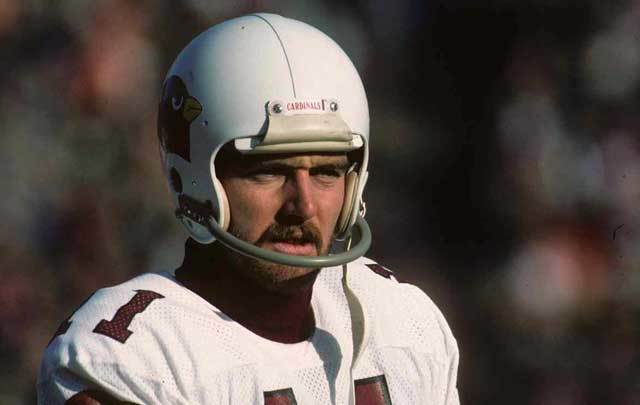Neil O’Donoghue has revealed how he moved to the United States at the age of 17 and became the last Irishman in the NFL.
Before he moved to the States, O’Donoghue worked as a ticket collector in Heuston station in Dublin and played part-time for Shamrock Rovers. Feeling his prospects were slim in Ireland, he jumped at the chance when his brother's friend asked him if he was interested in a scholarship to the U.S.
“My idea was to come over here for a year and have a good time,” he said. “As it turned out, I fell in love with the place.”
O'Donoghue would move to America to play soccer for Saint Bernard college. He was awarded the first soccer scholarship to the U.S. ever given to an Irish person.
A profile piece on the former NFL player in the Irish Times reveals how he would make the move to Auburn University, in Alabama, where he would become the starting placekicker for Auburn Tigers football team.
The Irish Times writes that when Saint Bernard dropped its soccer program, O'Donoghue decided to look elsewhere. He made the 163-mile journey to Auburn.
O’Donoghue, who is now 63, had never played American football before and had only ever been to one match in his life, but he was determined to earn a full scholarship and stay in the States.
“I drove down with a couple of buddies and knocked on the coach’s door. I was sticking my neck out but I didn’t know any better. I thought I had the ability to do it,” he said.
Auburn captain Liston Eddins says he was working out one morning when he saw the head coach, Ralph Jordan, enter the field with O’Donoghue.
“How can this tall guy possibly kick,” Eddins says he thought to himself.
He adds: “They started from about the 30-yard line and good God it goes so high and so far over the bar that coach Jordan motions him to back up 10 yards. He gets to the 40 and kicks two, and they clear the posts by a long way. Coach Jordan backed him up again and it goes through by a good 15 yards.”
Jordan became convinced of O’Donoghue’s talents and offered him a full scholarship. Within two years of transferring to Auburn, O’Donoghue would be a fifth-round draft for the Buffalo Bills in 1977.
After a few lopsided performances, the Irish Times writes, O’Donoghue was cut after five games and a game-winning field goal that snapped a 14-game losing streak for the Bills.
O’Donoghue said he was hit hard by the cut and thought about “getting a real job.” But then in 1978, a call came from the Tampa Bay Buccaneers.
He felt he had perhaps not taken his opportunity with the Buffalo Bills as seriously as he could have and told himself it would be different this time. His second season there would prove to be one of the most memorable of his career.
He scored crucial kicks in wins against Baltimore, Minnesota and Detroit, and in the final game of the season, he kicked a fourth-quarter field goal to secure the NFC Central title for Tampa.
That season, Tampa would reach the Championship game, eventually losing 9-0 to the LA Rams. However, O’Donoghue sat on the sidelines and became frustrated. In the summer months Coach John McKay decided O’Donoghue’s field-goal kicking was too erratic and cut him.
O’Donoghue said he felt he’d had enough.
“There was a lot of pressure doing what I was doing. When you get out of it, it’s like the air is let out of a balloon and you take a big deep breath. It was nice to work as a normal person.”
He began working on building sites, constructing condos. On the 10th floor of a high-rise, he was told St Louis Cardinals were interested in him. “That was on a Monday and I was playing that next Sunday against Washington.”
During his time at the Cardinals, for which he played from 1980-85, O’Donoghue is best remembered for missing three field-goal opportunities in one match in overtime, including one from only 19 yards. There was also a kick against Washington that came at the end of a record season for him. It was a game the Cardinals had to win if they were to make the play-offs.
Before that match, O’Donoghue had recorded a career-high 108 points. The Irish Times reports that added three more extra points and two field goals to bring his tally to a then franchise record of 117.
“My expectation was that they were going to throw the ball out on second down and stop the clock,” he says. “Instead, they went for a play and the ball was caught inbound with the clock ticking.”
O’Donoghue did not have time to set up properly and missed. The Cardinals dreams of the play-off were done. “That’s the way it goes,” he says.
He played one more season before being cut after missing three attempts during a defeat by the Houston Oilers.
“The thing that I’ll always remember about Neil O’Donoghue was the unique attitude that he displayed,” Head coach Jim Hanifan said at the time. “Neil battled through adversity on several occasions. I wish him good success.”
By now, O’Donoghue had had enough of football and decided to retire. He moved to Clearwater, Florida, with his family and began working in real estate before moving into insure and then on to a sales job in cars, which he has been doing now for more than 20 years.
O’Donoghue is still a football fan but his past as a player is behind him.
“When I left it, I left it – you got to leave that behind you,” he says.
“I did it for 10 years and succeeded at everything I wanted to do,” he says. “I wasn’t the best guy in there but I hung in there and I can walk away and say I did something.”




Comments